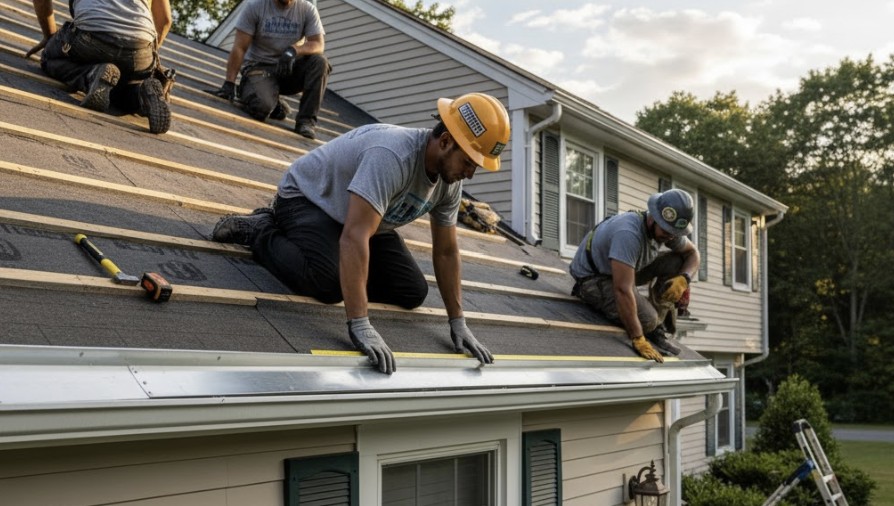When homeowners shop for a new roof, it’s natural to focus on the materials, the brand of shingles, underlayment, flashing, ventilation, and roofing system components. But in many cases, the warranty backing those materials and the workmanship is just as important. A strong warranty can be your safeguard against defects, installation errors, and unexpected costs down the road.
In the demanding climates of Massachusetts and Connecticut, where winters bring snow, ice, freeze-thaw cycles and summers bring heat and humidity, roofs endure a lot. The right materials plus the right warranty create a comprehensive protection package.
In this article, we’ll cover:
- The typical roofing materials used in MA & CT, and why
- Types of warranties (manufacturer, workmanship, system, extended)
- What warranties commonly cover, and what they don’t
- Typical warranty terms and limitations in our region
- How warranties can be voided (and how to protect yours)
- Why choosing a certified contractor matters
- What to ask and check before signing
- Final thoughts and call to action for JP Carroll Roofing
Common Roofing Materials In Massachusetts & Connecticut, And Their Warranty Implications
In New England, roofing materials are chosen for durability under snow load, wind, ice dams, and UV exposure. Some of the common materials you’ll see (especially on residential roofs) include:
- Asphalt architectural shingles, This is the standard residential roofing choice in both MA and CT. They provide good value, ease of installation, and compatibility with warranties from major brands (GAF, Owens Corning, CertainTeed, etc.).
- Architectural “laminate” or dimensional shingles, a premium version of asphalt shingle, offering thicker profiles, better wind resistance, and sometimes higher warranty tiers.
- 3-tab (strip) shingles, a more basic, lower-cost asphalt option; warranties tend to be more limited in duration.
- Metal roofing, occasionally used for residential or accent areas (e.g. dormers, roof edges). Metal products often come with long warranties (30–50 years or more) from manufacturers.
- Flat roof membranes (on low-slope homes or additions), EPDM, TPO, or modified bitumen systems. These have their own durability considerations and warranty regimes.
- Slate or synthetic slate, less common due to cost and weight, but when used they typically come with long warranties or full system guarantees.
Because asphalt shingles dominate in the region, many warranties you’ll see are tailored around them, which is why understanding how those warranties work is critical.
Types Of Roof Warranties: What They Are & Why They Matter
When people say “roof warranty,” they often conflate multiple types. In fact, there are several different warranties or guarantees that play roles in protecting your roof.
1. Manufacturer (Material) Warranty
This is issued by the manufacturer of the roofing product (shingle maker, metal panel maker, membrane maker). It covers defects in the materials themselves, e.g.:
- Premature granule loss
- Cracking, blistering, or curling due to material defect
- Manufacturing flaws (manufacturing-induced defects)
However, most manufacturer warranties do not cover labor (installation) unless you have a special or enhanced warranty package. Also, many are limited warranties and prorated (i.e. coverage declines over time).
2. Workmanship (Installation) Warranty
This is offered by the contractor installing your roof (in this case, JP Carroll Roofing, or another roofer). It guarantees that the workmanship, how the roof was installed, meets standards. If the roofing crew misplaces flashing, fails to seal penetrations correctly, or violates manufacturer installation rules, a workmanship warranty can cover those failures.
Unlike material warranties, workmanship warranties often are non-prorated (you either are in the warranty period or not) and cover labor to correct installation defects.
3. System, Enhanced, Or “Extended” Warranties
Some manufacturers offer a system warranty or enhanced warranty, which only kick in if you (or your contractor) use a full “roofing system”, i.e. the manufacturer’s approved underlayment, flashings, vents, and accessory products. In those cases, the warranty might also include some labor coverage or extended periods of non-prorated coverage.
These warranties are often only available if the contractor is certified or approved by the manufacturer.
4. Transferable Warranties
Some warranties (especially manufacturer ones) allow transfer to a new homeowner if you sell your property, which can add value in a real estate transaction. But often there are conditions, a limited timeframe for transfer, or fees.
Typical Warranty Terms In Massachusetts & Connecticut
To make this more concrete, here’s what homeowners in MA and CT often see in practice:
- Manufacturer warranties for architectural asphalt shingles often come with “limited lifetime” coverage for materials, meaning coverage may last for the life of the roof as designated by the manufacturer. However, much of that coverage is prorated over time.
- Some warranties include an initial non-prorated period (for example, full coverage on materials for the first 10–15 years) before transitioning to prorated coverage.
- Workmanship warranties from contractors in New England commonly range from 5 to 20 years (depending on the roofer), though shorter warranties (1–2 years) still exist.
- In Connecticut, many roofing companies market lifetime material warranties plus up to 20 years labor/workmanship warranties, when conditions qualify.
- In MA, premium contractors and certified installers may offer warranties such as GAF’s “Silver Pledge” or similar enhanced warranties with longer or no-prorated periods.
- Transferability is often allowed but typically must be done within a limited timeframe (e.g. 30–60 days after sale), and only once.
Because warranty terms vary widely (even among roofs in the same town), reading the specific warranty documents, and not assuming coverage, is crucial.
What Warranties Cover, And What They Don’t
Knowing the fine print is especially important. Typical coverage includes:
- Defects in materials (per manufacturer rules)
- Failures caused by manufacturing flaws (e.g. cracking, blistering)
- Labor (under workmanship warranty) to remedy installation errors
- Coverage for certain accessory components (if included in system warranty)
- Sometimes wind damage, algae resistance, or hail resistance (depending on the warranty)
Common exclusions and limitations include:
- Damage from extreme weather beyond warranty thresholds (e.g. hurricane-level wind, tornadoes)
- Normal wear & tear, aging, or gradual deterioration
- Damage caused by lack of maintenance (clogged gutters, failure to inspect, neglect)
- Improper ventilation, insulation, or venting that causes roof deck issues
- Unauthorized repairs by third parties (not the original contractor)
- Alterations to the roof (installing new penetrations, adding skylights) without following manufacturer specs
- Failure to register the warranty, missing documentation, or missing deadlines
A roofing warranty is often as much a legal document limiting liability as it is a promise to repair.
How Warranties Can Be Voided, And How You Can Protect Them
A strong warranty can be rendered useless if certain conditions are violated. Some common ways warranties get voided:
- Using a non-certified contractor, many enhanced warranties require certified installation.
- Ignoring manufacturer installation guidelines (e.g. incorrect nail spacing, improper flashing, stacking shingles)
- Poor ventilation or improper attic setup, heat and moisture buildup degrade roofing components.
- Installing over existing shingles (without proper tear-off)
- Failing to maintain gutters, roof, and drainage systems
- Unauthorized modifications or repairs by unapproved persons
- Not registering the warranty or missing registration deadlines
- Altering the roof after installation without proper compliance
To protect your warranty:
- Work with a certified, reputable roofing contractor
- Ensure full documentation and registration
- Follow maintenance guidelines (clean gutters, inspect annually)
- Keep records, invoices, inspection reports
- Avoid unnecessary roof penetrations or changes without consulting a qualified roofer
Why Hiring A Certified, Warranty-Aware Roofer Makes All The Difference
Even if you choose high-quality materials, your roof’s longevity often comes down to who installs it. A poor installation might cause leaks, flashing failures, or early wear, none of which will be covered under a material warranty if the cause is workmanship.
By contrast, a contractor who is approved or certified by the manufacturer can:
- Offer access to enhanced warranty tiers
- Ensure installation meets manufacturer specs
- Provide a solid workmanship warranty
- Help with warranty claims and documentation
- Be financially stable and reliable over the years
JP Carroll Roofing, for example, is committed to using certified practices and standing behind both materials and workmanship, so your warranty is meaningful, not just a piece of paper.
What To Ask & Check Before You Commit
When comparing roofing quotes, always clarify:
- What is the material (manufacturer) warranty? Duration, prorated vs. non-prorated, transferability
- What is the workmanship warranty from the contractor? How long, non-prorated?
- Are system warranties or premium warranties available, and what conditions (certification, full system) apply?
- Is the installer certified by the manufacturer?
- What actions can void the warranty (and how can you avoid those)?
- Is the warranty registered and documented in writing?
- Will your warranty cover all components, not just shingles (flashings, underlayment, vents)?
- How does the warranty handle labor, tear-off, disposal costs?
Final Thoughts
Your roof is a long-term investment, and the materials you choose certainly matter. But without a solid warranty and careful installation, even the best shingles can fail prematurely or leave you with heavy repair costs. In Massachusetts and Connecticut, where weather stresses your roof year after year, that warranty can literally make or break your roofing experience.
At JP Carroll Roofing, we stand behind both the materials and our workmanship. We use certified installation practices, offer robust workmanship guarantees, and guide homeowners through warranty registration and maintenance. Our goal is not just to install a roof; it’s to protect your home, your investment, and your peace of mind.
If you’re considering a new roof or want to review your warranty options in Massachusetts or Connecticut, contact JP Carroll Roofing today. Let’s make sure your roof is backed by quality materials and a warranty that works.



